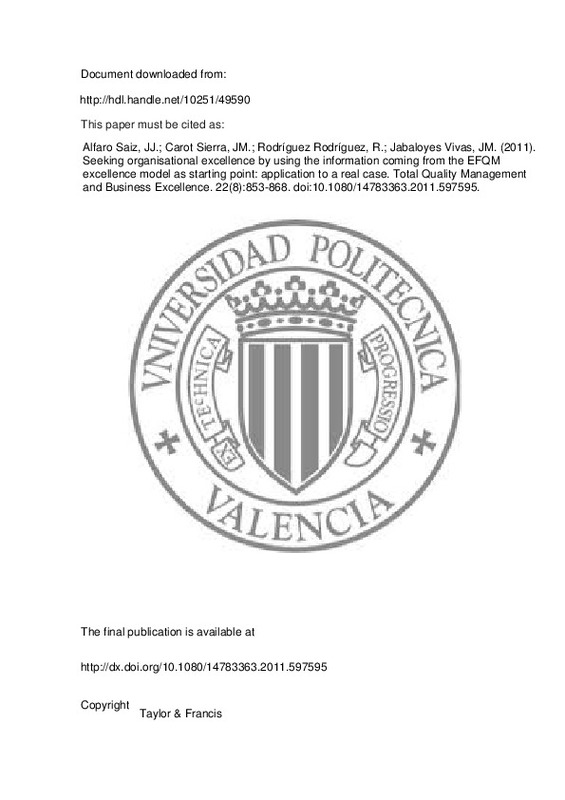Carlos Bou‐Llusar, J., Escrig‐Tena, A. B., Roca‐Puig, V., & Beltrán‐Martín, I. (2005). To what extent do enablers explain results in the EFQM excellence model? International Journal of Quality & Reliability Management, 22(4), 337-353. doi:10.1108/02656710510591192
Calvo‐Mora, A., Leal, A., & Roldán, J. L. (2006). Using enablers of the EFQM model to manage institutions of higher education. Quality Assurance in Education, 14(2), 99-122. doi:10.1108/09684880610662006
Dale, B. G., Zairi, M., Van der Wiele, A., & Williams, A. R. T. (2000). Quality is dead in Europe – long live excellence ‐ true or false? Measuring Business Excellence, 4(3), 4-10. doi:10.1108/13683040010377737
[+]
Carlos Bou‐Llusar, J., Escrig‐Tena, A. B., Roca‐Puig, V., & Beltrán‐Martín, I. (2005). To what extent do enablers explain results in the EFQM excellence model? International Journal of Quality & Reliability Management, 22(4), 337-353. doi:10.1108/02656710510591192
Calvo‐Mora, A., Leal, A., & Roldán, J. L. (2006). Using enablers of the EFQM model to manage institutions of higher education. Quality Assurance in Education, 14(2), 99-122. doi:10.1108/09684880610662006
Dale, B. G., Zairi, M., Van der Wiele, A., & Williams, A. R. T. (2000). Quality is dead in Europe – long live excellence ‐ true or false? Measuring Business Excellence, 4(3), 4-10. doi:10.1108/13683040010377737
Eskildsen, J. K., Kristensen, K., & Jørn Juhl, H. (2001). The criterion weights of the EFQM excellence model. International Journal of Quality & Reliability Management, 18(8), 783-795. doi:10.1108/eum0000000006033
Farrar, M. (2000). Structuring success: A case study in the use of the EFQM Excellence Model in school improvement. Total Quality Management, 11(4-6), 691-696. doi:10.1080/09544120050008084
Hides, M. T., Davies, J., & Jackson, S. (2004). Implementation of EFQM excellence model self‐assessment in the UK higher education sector – lessons learned from other sectors. The TQM Magazine, 16(3), 194-201. doi:10.1108/09544780410532936
Li, M., & Yang, J. B. (2003). A decision model for self‐assessment of business process based on the EFQM excellence model. International Journal of Quality & Reliability Management, 20(2), 164-188. doi:10.1108/02656710310456608
Martín‐Castilla, J. I., & Rodríguez‐Ruiz, Ó. (2008). EFQM model: knowledge governance and competitive advantage. Journal of Intellectual Capital, 9(1), 133-156. doi:10.1108/14691930810845858
McAdam, R., & Welsh, W. (2000). A critical review of the business excellence quality model applied to further education colleges. Quality Assurance in Education, 8(3), 120-130. doi:10.1108/09684880010372716
Ruiz-Carrillo, J. I. C., & Fernández-Ortiz, R. (2005). Theoretical foundation of the EFQM model: the resource-based view. Total Quality Management & Business Excellence, 16(1), 31-55. doi:10.1080/1478336042000309857
Rusjan, B. (2005). Usefulness of the EFQM excellence model: Theoretical explanation of some conceptual and methodological issues. Total Quality Management & Business Excellence, 16(3), 363-380. doi:10.1080/14783360500053972
José Tarí, J. (2006). An EFQM model self‐assessment exercise at a Spanish university. Journal of Educational Administration, 44(2), 170-188. doi:10.1108/09578230610652051
Wongrassamee, S., Simmons, J. E. L., & Gardiner, P. D. (2003). Performance measurement tools: the Balanced Scorecard and the EFQM Excellence Model. Measuring Business Excellence, 7(1), 14-29. doi:10.1108/13683040310466690
Yang, J. B., Dale, B. G., & Siow, C. H. R. (2001). Self-assessment of excellence: An application of the evidential reasoning approach. International Journal of Production Research, 39(16), 3789-3812. doi:10.1080/00207540110069078
[-]







![[Cerrado]](/themes/UPV/images/candado.png)


